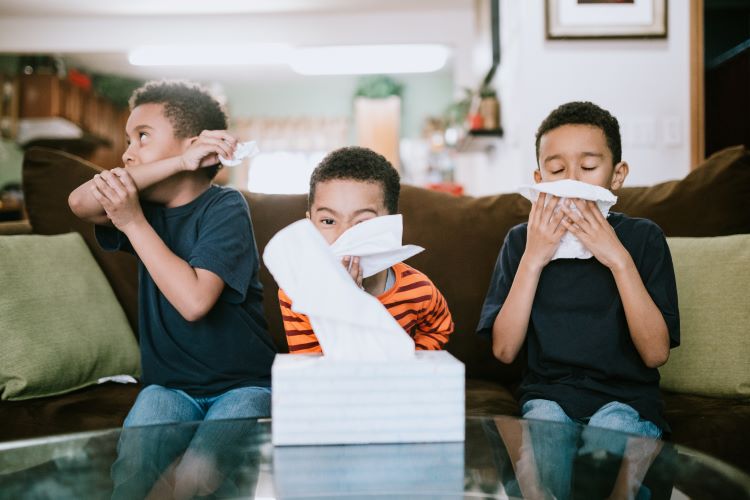
With school back in session and the weather cooling down, we’re headed straight into cold and flu season. Throughout the fall and winter, viral respiratory illnesses— including influenza viruses, RSV, and COVID-19—become more common. They are often spread through respiratory droplets when a sick person sneezes, coughs, or even speaks. Sometimes, illness-causing germs are also spread through contact with objects or surfaces like doorknobs or toys.
Symptoms may include:
- Sore throat
- Fever
- Cough
- Congestion or runny nose
- Sneezing
- Fatigue
- Body aches
These illnesses are highly contagious and can pose risks to vulnerable groups like children, the elderly, and immunocompromised individuals. Read on to learn more about how you can prevent the spread of illness and what to do if you catch what’s going around.
Preventing Illness
Many strategies can protect you and your loved ones from getting sick this season:
Staying up to date with recommended vaccinations helps keep your family healthy. For example, getting an annual flu shot is the best way to prevent flu and potentially serious complications it can cause. The CDC recommends flu vaccination for everyone 6 months and older. Talk to your primary care provider about which vaccines may be appropriate for you and your family.
Good hygiene habits are incredibly important to reduce the spread of many illness-causing germs. Wash your hands frequently and thoroughly with soap and water. Keep hand sanitizer nearby for those times when soap and water aren’t accessible. And don’t forget to wipe down commonly touched surfaces, like light switches, TV remotes, and even your phone.
A healthy lifestyle can support your immune system in fighting off viruses and bacteria. This means maintaining a nutritious diet, getting enough sleep, and exercising regularly. Remember the adage, “laughter is the best medicine”? There is some truth to it – socializing with your loved ones can support your health. Just make sure to avoid visiting with anyone you know is sick until they have recovered.
Avoid spreading germs through sharing drinks, straws, or utensils. If you find yourself coughing or sneezing, cover your mouth by coughing into your elbow or a tissue. This helps keep the germs off your hands where they may spread to other surfaces.
When you are sick or feeling unwell, stay home to avoid infecting your coworkers or classmates. If you must be around people when they’re sick – or vice versa – a mask can help prevent the spread of illness.
I’m Sick ... Now What?
Despite our best efforts to prevent illness, sometimes it catches up with us. Here’s what you can do if you’re feeling under the weather.
Should I get a swab?
In most cases, test results won’t change the treatment plan for a viral upper respiratory infection. Whether it’s COVID-19, the flu, or just a common cold, this type of illness is often manageable at home with rest and supportive care. Over-the-counter medications like Tylenol (acetaminophen) or Motrin (ibuprofen) can help ease any aches or discomfort. Drink fluids like water, tea, or broth, and get plenty of rest.
You should wait to return to school, work, or other public places until your fever is gone (without the use of fever-reducing medicine) for 24 hours.
If you do need medical care, KRMC has options to get you feeling better as quickly as possible:
Same-Day Sick Appointments
Many primary care providers offer a limited number of same-day sick appointments. Call when your doctor's office opens and see if they can get you in for a sick visit.
KRMC Urgent Care – provides care and treatment for conditions that are not life-threatening. If your symptoms are severe and not manageable at home, urgent care may be a good option.
KRMC Urgent Care is located at 1726 Beverly Avenue in Kingman and open seven days a week from 7:00 am-6:00 pm
KRMC Emergency Department
Visit the emergency department if you or your child show signs of extreme illness, including:
- Labored or noisy breathing, like wheezing
- Chest pain
- Dizziness
- Confusion
- Retractions (when the skin between the ribs pulls in with breathing)
Kingman Regional Medical Center is located at 3269 Stockton Hill Road.
Bottom line: getting sick is no fun for anyone. From taking time off work and school to missing out on your planned activities, illness can disrupt your life. But you can take steps to prevent it—and if you do come down with something, KRMC is here for you.
